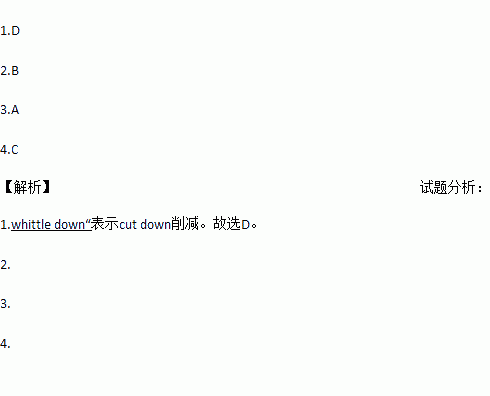题目内容
I ran into a local store today to pick up a few things. With an important meeting to attend, I was in a hurry , so I didn’t take a cart (手推车) on my way inside. As I walked between the shelves in the store, I passed by a young couple and their baby. I continued going through the store, picked up a few items I needed and ended up standing behind this couple in the checkout line.
While waiting, I noticed that the young father was holding his money tightly and nervously. The young mother was carrying a baby in her arms and asked the cashier (收银员) for a job application.
When the total was rung up, they had to pick items out of their cart because they didn’t have enough money. But all their items were basic necessities(必需品) that they needed most. It just broke my heart to watch the couple try to think about what they could do without. However, they were able to whittle down their items and paid the bill with the money that they had.
After they left, I quietly asked the cashier to add those items to mine. The cashier rang everything up, and then got me a shopping cart. We put in their items and I hurried over to their car. “This is for you,” I told them.
The young father just looked at me with such appreciation and thanked me. I will never forget the expression in his eyes. As I was getting into my car, they drove over. The young mother said, “Miss, thank you so much.”
Tears welled up in my eyes---as they are again now, while I write this. “You are so welcome. Pay it forward some day,” I replied.
1.The underlined phrase “whittle down” in Paragraph 3 probably means “__________”.
A. add to B. break down
C. pay for D. cut down
2.The author felt __________ to watch the couple taking some items out.
A. angry B. sad
C. excited D. interested
3.It can be inferred from the passage that _________.
A. the young mother didn’t have a job then
B. the young father felt so sorry to accept help
C. the cashier treated the young couple impolitely
D. the young couple bought something unnecessary
4.The author ’ s main purpose in sharing the story is to tell us __________.
A. what a great plan she made
B. to take a cart while shopping
C. to help those who are in need
D. how to pick out basic necessities
Should doctors ever lie to benefit their patients to speed recovery or to cover the coming of death? In medicine as in law, government, and other lines of work, the requirements of honesty often seem dwarfed by greater needs; the need to protect patients from brutal news, to uphold a promise of secrecy or to advance the public interest.
What should doctors say, for example, to a 46-year-old man coming in for a routine physical checkup just before going on vacation with his family who, though he feels in perfect health, is found to have a form of cancer that will cause him to die within six months? Is it best to tell him the truth? If he asks, should doctors reject that he is ill, or minimize the gravity of the illness? Should they at least hide the truth until after the family vacation?
Doctors face such choices often. At times, they see important reasons to lie for the patients’ own sake; in their eyes, such lies differ sharply from self-serving ones.
Studies show that most doctors sincerely believe that the seriously ill patients do not want to know the truth about their condition, and that informing them of risks destroys their hope, so that they may recover more slowly, or deteriorate faster, perhaps even commit suicide.
But other studies show that, contrary to the belief of many physicians, a great majority of patients do want to be told the truth, even about serious illness, and feel cheated when they learn that they have been misled. We are also learning that truthful information, humanely conveyed, helps patients cope with illness; help them tolerate pain better with less medicine, and even recover faster after surgery.
There is an urgent need to debate this issue openly. Not only in medicine, but in other professions as well, practitioners may find themselves repeatedly in difficulty where serious consequences seem avoidable only through deception. Yet the public has every reason to know the professional deception, for such practices are peculiarly likely to become deeply rooted, to spread, and to trust. Neither in medicine, nor in law, government, or the social sciences can there be comfort in the old saying, “What you don’t know can’t hurt you.”
Title: 1. Or Not
Different 2. | ·Most doctors are in 3. of lying for the patients’ own sake. |
·A great majority of patients 4. on being told the truth. | |
Reasons for 5. lying to patients | ·Informing patients of the truth about their condition destroys their hope, 6. to recovering more slowly, or deteriorating faster, perhaps even 7. themselves. |
Reasons 8. lying to patients | ·The truthful information helps patients to 9. their illness, help them tolerate pain better with less medicine, and even recover faster after surgery. ·Most patients feel 10. when they learn that they have been misled. |
最近你校开展了“敬重父母”的活动, 请你根据下表提示, 以“Learning to Respect Our Parents ”为题为21st Century 写一则报道。字数:120字左右
主题 | Learning to Respect Our Parents |
宗旨 | 敬重父母是中华民族的传统美德(traditional moral value) |
现状 | 大多数学生都是独生子女, 只注重自己, 不顾父母 |
决定 | 开展“敬重父母” 活动 |
措施 | 制定了10条规定,如:要记住父母的生日, 并向父母表示祝愿;父母回家时要与他们打招呼; 离家出门前要告诉父母你要去做什么。。。。。。 |
效果 | 受到家长和社会各方面的好评和赞扬 |
________________________________________________________________________________________________________________________________________________________________

